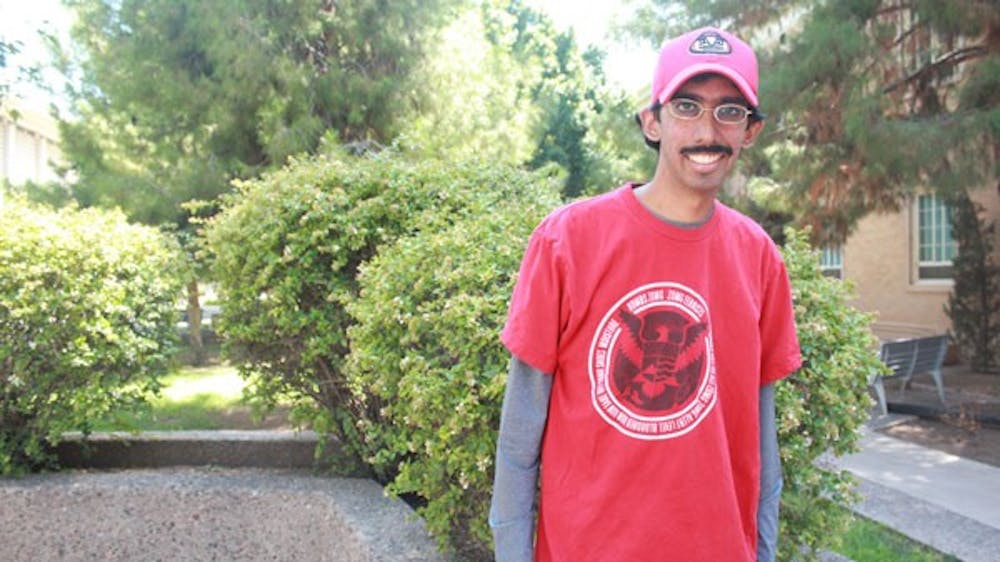 Graduate student Arijit Guha is currently battling colon cancer. During the past year, he also struggled with Aetna Student Health insurance, which failed to cover much of his cancer treatment. (Photo by Seo-Young Jun)
Graduate student Arijit Guha is currently battling colon cancer. During the past year, he also struggled with Aetna Student Health insurance, which failed to cover much of his cancer treatment. (Photo by Seo-Young Jun)Sustainability graduate student Arijit Guha thought he had caught a stomach bug when he returned from a brief trip to India in January 2011. Two weeks later, he was diagnosed with colon cancer.
Guha went to ASU Health Services, where doctors performed a variety of tests that yielded no results.
Following a colonoscopy that revealed a large tumor and two surgeries, Guha underwent a third procedure that seemed to have worked in April.
“Everything looked fine then, so I was given a chemo break until August,” Guha said.
That’s when he started to feel ill again, and a doctor’s report indicated he had innumerable tumors throughout his abdominal cavity.
“Essentially, we were back at square one,” Guha said.
This is not the only issue Guha has had to face during this past year. His student health policy stopped covering his medical expenses in January.
“In less than 11 months, in January of this year, I reached what was the very low lifetime cap of the student health policy, which is $300,000,” Guha said. “Aetna was no longer paying for any treatment.”
Guha said ASU offered him the health plan because he is a graduate student employed by the University. He was aware the lifetime cap was low, but he didn’t expect he would ever use it.
Guha said there were two shortcomings with Aetna’s policy: the low lifetime cap and a lack of prescription drug coverage.
“The idea of insurance is that it is supposed to protect you from worst-case scenarios,” Guha said. “We knew the limitations of the plan. The fact is there is no functional market for health insurance.”
Social psychology graduate student Jose Duarte, who has the same health insurance as Guha, was diagnosed with thyroid cancer in 2010.
Following a surgery and radiation therapy, Duarte no longer struggles with his disease.
The health policy assigned to graduate students does not cover enough, Duarte said.
“It seems that it’s designed for undergrads who live on campus because you can’t see any specialists,” Duarte said. “For me it wasn’t so difficult, but for Arijit it was a big struggle.”
Guha began using social media to fundraise for the $118,000 he needed for medical bills.
“I created a website, Poopstrong.org, where people could give donations and buy … silly t-shirts,” Guha said. “I was very much reliant upon the community to get through this.”
Guha said the website had more than 30,000 hits on the first day. He has raised more than $130,000, mostly through donations.
B.L. Turner first met Guha when they worked at Clark University in Massachusetts.
Turner, now Guha’s adviser, recruited him to attend ASU.
He said he was very impressed with poopstrong’s success.
“I thought Poop Strong was incredible,” Turner said. “Much of the credit goes to the students of ASU who supported him.”
Turner said Guha’s conviction to fight for justice has grown stronger since his diagnosis.
“He has a very different attitude about life in general, given the serious issues he’s confronted,” Turner said. “He simply won’t take what he deems biased or unfair.”
After Guha read a report in July that indicated Aetna’s profits were higher than anticipated, he began expressing his frustrations via Twitter. Aetna started responding to his tweets.
“(It felt like) empty corporate speak, and it was obviously clear they weren’t doing what they could do to help me,” Guha said. “I started getting a bit combative.”
Aetna’s CEO Mark Bertolini began to tweet him and eventually told him Aetna would help him, Guha said.
An Aetna executive called Guha shortly after and said they would cover all of his medical expenses.
“For me, it worked out remarkably well,” Guha said.
Aetna’s decision allowed Guha to donate all of the money he had raised through poopstrong to various charities.
“We’re still long ways away from what I call a sane, just, equitable health care system,” Guha said. “Patients are hurt when we prioritize profits over patients.”
Guha began a new chemotherapy Tuesday and he said he is hopeful about the results.
Reach the reporter at dpbaltaz@asu.edu




